

The Simplicity Collective. On Independence Day, 1845, a few days before his twenty-eighth birthday, Henry Thoreau left his town of Concord and went to live alone in the woods, on the shores of Walden Pond, a mile from any neighbour.
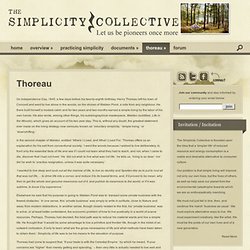
He there built himself a modest cabin and for two years and two months earned a simple living by the labor of his own hands. He also wrote, among other things, his autobiographical masterpiece, Walden (subtitled, Life in the Woods), which gives an account of his two year stay. This is, without any doubt, the greatest statement ever made on the living strategy now variously known as ‘voluntary simplicity,’ ‘simple living,’ or ‘downshifting.’
Elsewhere he said that his purpose in going to Walden Pond was to ‘transact some private business with the fewest obstacles.’ In one sense, this ‘private business’ was simply to write in solitude, close to Nature and away from modern distractions. To the people of Concord, ‘this was sheer idleness… no doubt.’ Sustainable Design in Architecture. Antanas Procuta Architects advocates environmental responsibility and wise resource use.
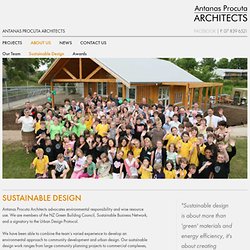
We are members of the NZ Green Building Council, Sustainable Business Network, and a signatory to the Urban Design Protocol. We have been able to combine the team’s varied experience to develop an environmental approach to community development and urban design. Our sustainable design work ranges from large community planning projects to commercial complexes, public buildings, and residential design. Antanas Procuta Architects has successfully diversified to major projects in urban and suburban settings.
For example, providing the urban design and architectural direction for the english village style Cambridge Park development, and for Taupo District Council’s Lot 60 Urban Design competition: a project which emphasizes the important relationship between land use and community design. UPDATED: Clean Energy Centre explores possible Taupo off-grid housing community. By Siobhan Leathley, Taupo could be in for a new eco-sustainable housing community, reshaping the way houses receive heat, electricity, water, and use wastewater.
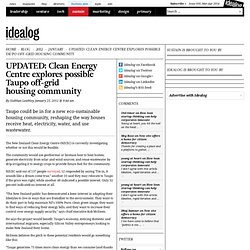
The New Zealand Clean Energy Centre (NZCEC) is currently investigating whether or not this would be feasible. The community would use geothermal or biomass heat to heat homes; generate electricity from solar and wind sources; and reuse wastewater by drip-irrigating it to energy crops to provide future fuel for the community. NZCEC said out of 137 people surveyed, 12 responded by saying “I’m in, it sounds like a dream come true,” another 33 said they may relocate to Taupo if the price was right, while another 48 indicated a possible interest. Only 32 percent indicated no interest at all. “The New Zealand public has demonstrated a keen interest in adapting their lifestyles to live in ways that are friendlier to the environment.
McEwen believes the pitch to these potential residents would go something like this: Share this on Tagged as. Build-143-56-Feature-Innovation-Nuturing-Growth.pdf. Joining an Ecovillage. Each time more people are willing to leave their actual life behind and step into a more fulfilling life situation.
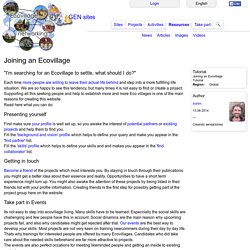
We are so happy to see this tendency, but many times it is not easy to find or create a project. Supporting all this seeking people and help to establish more and more Eco villages is one of the main reasons for creating this website. Read here what you can do: Presenting yourself First make sure your profile is well set up, so you awake the interest of potential partners or existing projects and help them to find you. Getting in touch Become a friend of the projects which most interests you.
Take part in Events Its not easy to step into ecovillage living. Find inspiration and knowledge Take advance of our resources. Get advice If you still don't know what to do, or how to attent certain personal challenges, you should consult our forum. Good luck for your quest. Sign up for Workawayers. Eco housing loans › Personal › Prometheus Finance. There are a variety of factors that we believe contribute to a truly green home.
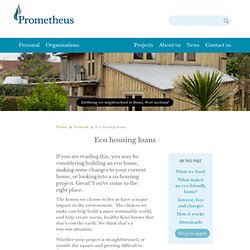
We don’t have a ‘tick box’ approach to assessing projects – if we can see an environmental benefit, and the project can be valued, we’ll consider it. We’ve listed a few ideas we think make a green home and are interested in financing. This is by no means exhaustive, and we don’t expect you to include them all. Comprehensive insulation In traditional NZ homes, heat loss in winter is a problem. Retrofitting insulation in walls, ceilings, and underfloor can be difficult, but for new houses, comprehensive insulation is a priority.
Thermally broken double (or triple) window glazing also helps to significantly reduce heat loss and cut down exterior noise. Heavy mass construction, such as North-facing heat sinks (including thick solid walls and floors), absorb the sun’s heat during the day and release it into the house during the night. Size Environmentally, bigger doesn’t equal better. Eco housing loans › Personal › Prometheus Finance.